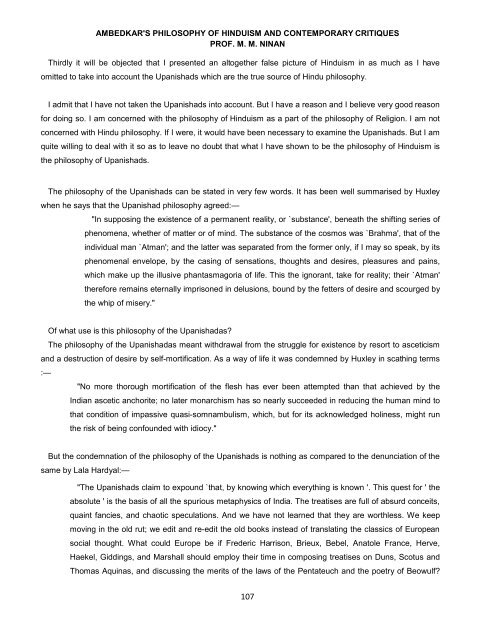Ambedkar-Philosophy of Hinduism
Create successful ePaper yourself
Turn your PDF publications into a flip-book with our unique Google optimized e-Paper software.
AMBEDKAR'S PHILOSOPHY OF HINDUISM AND CONTEMPORARY CRITIQUES<br />
PROF. M. M. NINAN<br />
Thirdly it will be objected that I presented an altogether false picture <strong>of</strong> <strong>Hinduism</strong> in as much as I have<br />
omitted to take into account the Upanishads which are the true source <strong>of</strong> Hindu philosophy.<br />
I admit that I have not taken the Upanishads into account. But I have a reason and I believe very good reason<br />
for doing so. I am concerned with the philosophy <strong>of</strong> <strong>Hinduism</strong> as a part <strong>of</strong> the philosophy <strong>of</strong> Religion. I am not<br />
concerned with Hindu philosophy. If I were, it would have been necessary to examine the Upanishads. But I am<br />
quite willing to deal with it so as to leave no doubt that what I have shown to be the philosophy <strong>of</strong> <strong>Hinduism</strong> is<br />
the philosophy <strong>of</strong> Upanishads.<br />
The philosophy <strong>of</strong> the Upanishads can be stated in very few words. It has been well summarised by Huxley<br />
when he says that the Upanishad philosophy agreed:—<br />
"In supposing the existence <strong>of</strong> a permanent reality, or `substance', beneath the shifting series <strong>of</strong><br />
phenomena, whether <strong>of</strong> matter or <strong>of</strong> mind. The substance <strong>of</strong> the cosmos was `Brahma', that <strong>of</strong> the<br />
individual man `Atman'; and the latter was separated from the former only, if I may so speak, by its<br />
phenomenal envelope, by the casing <strong>of</strong> sensations, thoughts and desires, pleasures and pains,<br />
which make up the illusive phantasmagoria <strong>of</strong> life. This the ignorant, take for reality; their `Atman'<br />
therefore remains eternally imprisoned in delusions, bound by the fetters <strong>of</strong> desire and scourged by<br />
the whip <strong>of</strong> misery."<br />
Of what use is this philosophy <strong>of</strong> the Upanishadas?<br />
The philosophy <strong>of</strong> the Upanishadas meant withdrawal from the struggle for existence by resort to asceticism<br />
and a destruction <strong>of</strong> desire by self-mortification. As a way <strong>of</strong> life it was condemned by Huxley in scathing terms<br />
:—<br />
"No more thorough mortification <strong>of</strong> the flesh has ever been attempted than that achieved by the<br />
Indian ascetic anchorite; no later monarchism has so nearly succeeded in reducing the human mind to<br />
that condition <strong>of</strong> impassive quasi-somnambulism, which, but for its acknowledged holiness, might run<br />
the risk <strong>of</strong> being confounded with idiocy."<br />
But the condemnation <strong>of</strong> the philosophy <strong>of</strong> the Upanishads is nothing as compared to the denunciation <strong>of</strong> the<br />
same by Lala Hardyal:—<br />
"The Upanishads claim to expound `that, by knowing which everything is known '. This quest for ' the<br />
absolute ' is the basis <strong>of</strong> all the spurious metaphysics <strong>of</strong> India. The treatises are full <strong>of</strong> absurd conceits,<br />
quaint fancies, and chaotic speculations. And we have not learned that they are worthless. We keep<br />
moving in the old rut; we edit and re-edit the old books instead <strong>of</strong> translating the classics <strong>of</strong> European<br />
social thought. What could Europe be if Frederic Harrison, Brieux, Bebel, Anatole France, Herve,<br />
Haekel, Giddings, and Marshall should employ their time in composing treatises on Duns, Scotus and<br />
Thomas Aquinas, and discussing the merits <strong>of</strong> the laws <strong>of</strong> the Pentateuch and the poetry <strong>of</strong> Beowulf?<br />
107


















